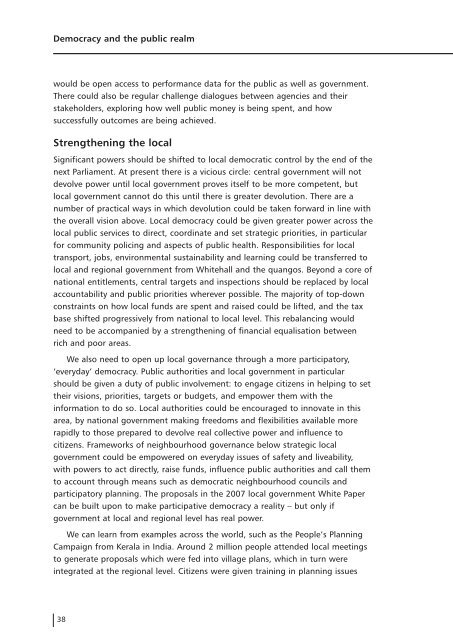Download this publication - Compass
Download this publication - Compass
Download this publication - Compass
- No tags were found...
Create successful ePaper yourself
Turn your PDF publications into a flip-book with our unique Google optimized e-Paper software.
Democracy and the public realmwould be open access to performance data for the public as well as government.There could also be regular challenge dialogues between agencies and theirstakeholders, exploring how well public money is being spent, and howsuccessfully outcomes are being achieved.Strengthening the localSignificant powers should be shifted to local democratic control by the end of thenext Parliament. At present there is a vicious circle: central government will notdevolve power until local government proves itself to be more competent, butlocal government cannot do <strong>this</strong> until there is greater devolution. There are anumber of practical ways in which devolution could be taken forward in line withthe overall vision above. Local democracy could be given greater power across thelocal public services to direct, coordinate and set strategic priorities, in particularfor community policing and aspects of public health. Responsibilities for localtransport, jobs, environmental sustainability and learning could be transferred tolocal and regional government from Whitehall and the quangos. Beyond a core ofnational entitlements, central targets and inspections should be replaced by localaccountability and public priorities wherever possible. The majority of top-downconstraints on how local funds are spent and raised could be lifted, and the taxbase shifted progressively from national to local level. This rebalancing wouldneed to be accompanied by a strengthening of financial equalisation betweenrich and poor areas.We also need to open up local governance through a more participatory,‘everyday’ democracy. Public authorities and local government in particularshould be given a duty of public involvement: to engage citizens in helping to settheir visions, priorities, targets or budgets, and empower them with theinformation to do so. Local authorities could be encouraged to innovate in <strong>this</strong>area, by national government making freedoms and flexibilities available morerapidly to those prepared to devolve real collective power and influence tocitizens. Frameworks of neighbourhood governance below strategic localgovernment could be empowered on everyday issues of safety and liveability,with powers to act directly, raise funds, influence public authorities and call themto account through means such as democratic neighbourhood councils andparticipatory planning. The proposals in the 2007 local government White Papercan be built upon to make participative democracy a reality – but only ifgovernment at local and regional level has real power.We can learn from examples across the world, such as the People’s PlanningCampaign from Kerala in India. Around 2 million people attended local meetingsto generate proposals which were fed into village plans, which in turn wereintegrated at the regional level. Citizens were given training in planning issues38





![[2012] UKUT 399 (TCC)](https://img.yumpu.com/51352289/1/184x260/2012-ukut-399-tcc.jpg?quality=85)




![Neutral Citation Number: [2009] EWHC 3198 (Ch) Case No: CH ...](https://img.yumpu.com/50120201/1/184x260/neutral-citation-number-2009-ewhc-3198-ch-case-no-ch-.jpg?quality=85)





